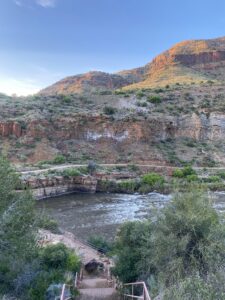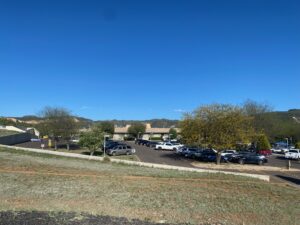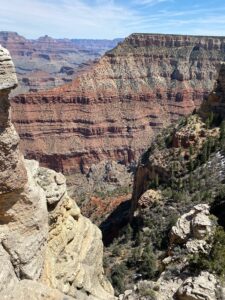Mennonite Health Journal
Articles on the intersection of faith and health
Mennonite Health Journal, Vol. 22, No. 2, August 2023.
SET Report
Tim Lehman
Fort Apache Indian Reservation
Summer, 2023
As a third-year family medicine resident at St. Joseph Hospital in Mishawaka, Indiana, I had the opportunity to collaborate with Mennonite Healthcare Fellowship and Student Elective Term (SET) for an away rotation in Whiteriver, Arizona located on the Fort Apache Indian Reservation.
Throughout my education, both at Goshen College and the Indiana University School of Medicine, I have been interested in learning about and serving different cultures and understanding how these cultures view medical care. I had the opportunity to explore these interests at Goshen College by working in a medical clinic during my study abroad term in Peru. Due to the demands of medical school, I was not able to travel or explore medicine in different cultures during my four years at IU. One of the draws to St. Joseph was the opportunity to spend a month away for a global health rotation, and with the help of SET, the Mennonite Church, and the leaders at Whiteriver Hospital I was able to arrange a month long rotation on the Fort Apache Reservation.
Whiteriver is the largest town in the Fort Apache Reservation with a population of approximately 5000. The reservation is approximately 2500 mi.² and has a total population of 12,000 people. The hospital in Whiteriver provides inpatient and outpatient medical care, emergency, obstetric and mental health services, and offers an in-house pharmacy. In addition to their traditional clinics and hospital services, they also have a community outreach program in which social workers and nurses travel throughout the community to visit patients who struggle with transportation. The hospital and their outreach programs are run by the Indian Health Service, a national organization tasked with providing quality health care to Native Americans.
Upon arriving in Whiteriver, I had a little knowledge of the history of the area, Apache, culture, or the Indian Health Service. Before starting in the medical setting, I visited a local museum to learn more about Apache history and culture. There I learned of a population that takes pride in their surrounding land and their community.
As I transitioned into the medical side of the rotation, I had the opportunity to experience a wide variety of clinical experiences. In the outpatient setting, I spent time with family and internal medicine physicians in a primary care clinic as they saw patients from their respective patient panels. I was able to experience specialty clinics that focus on conditions such as heart failure, pulmonary hypertension, and cirrhosis. A portion of my time was also spent with wound care and orthopedics as they served patients with injuries or diabetic foot wounds. In addition to my time at the main facility in Whiteriver, I saw patients in a smaller clinic 45 minutes from the main hospital. This clinic provided care for patients who were unable or could not afford to make the commute to Whiteriver for their medical care. I also had the opportunity to take care of patients in the emergency department, hospitalized patients on the ward, and obstetric patients, as well as spend time traveling with community outreach nurses as they visited patients in their homes. This was a meaningful experience, not only to see the social situation in which some people on the reservation live, but also to witness the connection the hospital had with the patients in the community.
In the clinic I learned medicine from several fantastic physicians, and, from interacting with their patients, I gained a better understanding of the challenges associated with providing and receiving care in the reservation setting. Throughout the community there are struggles with financial and housing insecurity as well as with substance use. While these challenges are not unique to Whiteriver, it was meaningful for me to see how physicians handled these in the context of the relationship between Native Americans and the United States government. These experiences will prove to be helpful as I transition into my own practice and am tasked with caring for patients from all walks of life with their own individual struggles.
Outside of the clinical setting, I was able to experience Apache culture through events within the community, including attending a sunrise dance. This is a ceremony that is performed for young women as they enter adulthood, and involves dancing and food and is often seen as a way for the community to show their support for the young woman.
As I started my time at Whiteriver, I was unsure what my time there would bring. What I found was a welcoming community of folks that were proud of who they were and where they came from but were honest and open about the struggles they still have. I found a community that was willing to befriend and help teach someone who is an outsider. My time in Arizona has made me more cognizant of the social struggles that different communities experience and the importance of recognizing these struggles to help provide better medical care. This experience reinforced for me the importance of providing cultural appropriate care instead of assuming each patient will have the same experience. As I move forward into my own practice, the experience of SET will continue to impact how I provide care and my involvement with the community in which I work. I am highly grateful for the opportunity that I was given, and I’m excited to see what other opportunities SET recipients have.
Would you like to join the conversation and be a part of supporting rising Mennonite healthcare workers like Jesse explore God’s calling in their vocation?



